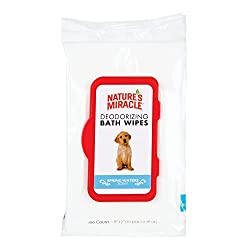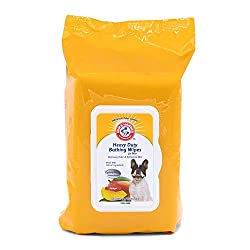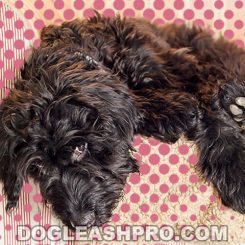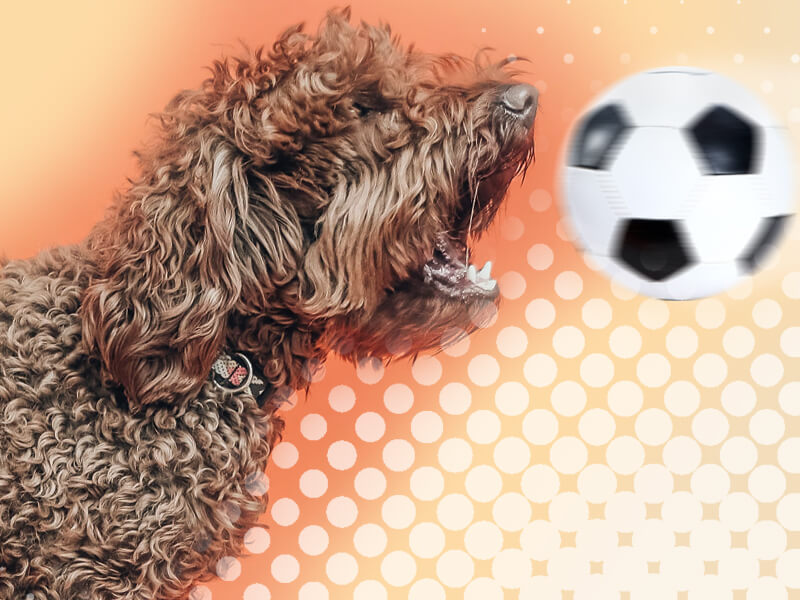
When it comes to the Goldendoodle dog breed, you’re probably aware that they come in a variety of coat colors. Deciding which dog breed is simply the first step. Selecting a coat color for you and your family is the next step. For many, this may be a more challenging step than the first.
While you may have heard of common Goldendoodle colors such as Apricot, light brown, cream, or golden, what about the Chocolate Goldendoodle?
In this comprehensive guide, we’ll discuss everything you need to know about the Chocolate Goldendoodle and help you figure out if this is the canine companion you’ll want to bring home. Let’s dig in.
Table of Contents
Chocolate Goldendoodle: a brief overview
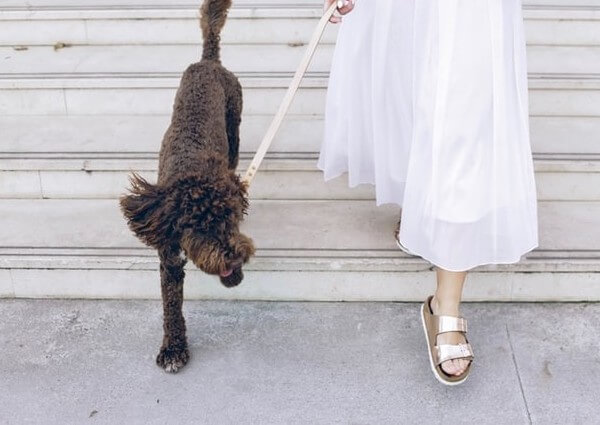
The Chocolate Goldendoodle is unique because his eye rims, paw pads, nose, and lips are chocolate or liver-colored instead of black. The peculiar coloring comes from a recessive gene, and both parents must carry it to produce chocolate puppies.
Since Golden Retrievers don’t have the chocolate gene, partnering them with a Chocolate Poodle doesn’t create a Chocolate Goldendoodle. For that, breeders breed Goldendoodles back with Chocolate Poodles or Goldendoodles.
Here’s a chart explaining the process:
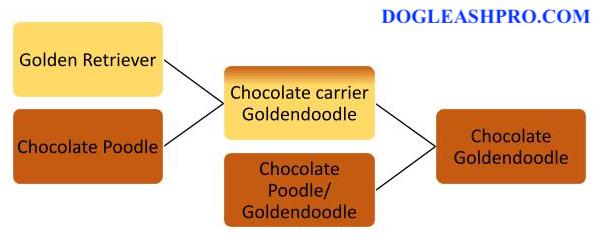
Since the first-generation Goldendoodles only have one copy of the Chocolate gene, they don’t express the Chocolate color.
Partnering them back with a Chocolate Poodle or Chocolate Goldendoodle gives a complete pair, and the resultant Goldendoodle is chocolate. Breeders may repeat the process to have different Goldendoodle colors.
What are the different colors of Goldendoodles?
Goldendoodles have numerous coat colors. Some come from dominant genes and are easy to reproduce, whereas others are recessive and may not express easily. Popular Goldendoodle colors are:
- Black.
- Red.
- Apricot.
- Cream/golden.
- Chocolate.
- Brown.
- Silver.
- Grey.
- Blue.
- Silver beige.
- Café au lait.
CHECK OUT: Black Goldendoodle (Complete Guide)
Chocolate Goldendoodle history
Poodles have non-shedding, hypoallergenic coats, and Golden Retrievers are all-time favorite family canines. Mixing the two creates the ultimate family pet that’s non-shedding and has the best qualities of both breeds.
Goldendoodles originally came in Apricot, cream, and golden colors, but breeders have experimented with them and produced pups in gorgeous shades. One such color variant is the Chocolate Goldendoodle.
Related Article: Red Goldendoodle (Complete Guide)
Chocolate Goldendoodle colors
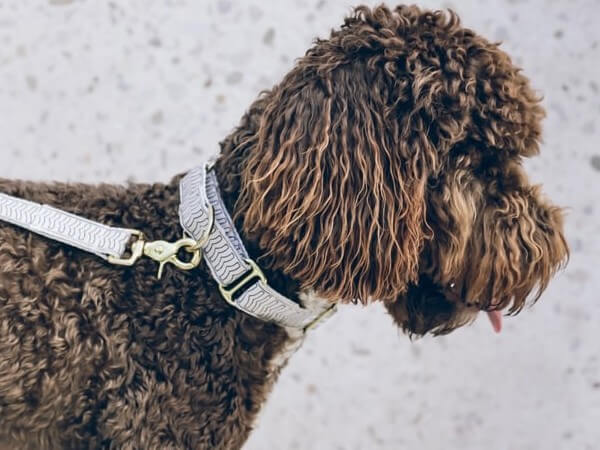
A Goldendoodle is chocolate as long as he carries the chocolate gene and has a liver-colored nose, lips, eye rims, and paw pads. Their coat can be of various shades; however, Chocolate Goldendoodles usually come in the following colors:
Chocolate Merle Goldendoodle
The merle pattern results from a gene that dilutes the melanin on the pup’s body. Chocolate Merle Goldendoodles have cloudy white, brown, and light brown patches on their coats.
Chocolate Brown Goldendoodle
Chocolate Goldendoodles with a plain brown color on their coat are called Chocolate Brown Goldendoodles.
Chocolate Parti Goldendoodle
A Chocolate Parti Goldendoodle is at least 50% white with patches of Chocolate on his coat.
Chocolate Phantom Goldendoodle
A Chocolate Phantom Goldendoodle has a brown or Chocolate coat with patches of tan on certain parts of his body. These tan patches usually occur on the eyebrows, chest, muzzle, legs, and below the tail.
SEE ALSO: Phantom Poodle (Complete Guide)
Chocolate Tuxedo Goldendoodle
Chocolate Tuxedo Goldendoodles have a brown coat with white on their chest and legs. The pattern makes them seem like they’re wearing a tuxedo.
Chocolate and white Goldendoodle
A Chocolate and White Goldendoodle can have any amount of white marking on a Chocolate coat.
Chocolate and white Parti Goldendoodle
Chocolate and White Parti Goldendoodles have at least 50% of their coat covered in white.
Dark Chocolate Goldendoodle
Most Chocolate Goldendoodle puppies are born dark Chocolate and then turn a lighter shade with age. In some rare cases, Dark Chocolate Goldendoodles retain their rich color even when they’re fully grown.
Chocolate Goldendoodle with blue eyes
For a Chocolate Goldendoodle, blue eyes are highly unique. Neither Poodles nor Golden Retrievers have the blue eye genes, so a Chocolate Goldendoodle with blue eyes likely has another breed in his parentage.
If the Chocolate Goldendoodle has the merle gene, then this could also cause one or both eyes to be blue.
You may come across Chocolate Goldendoodle puppies with blue eyes, but that eye color may change to dark brown when they grow older.
Chocolate Goldendoodle with green eyes
Green is perhaps the rarest eye color among canines. Only a few breeds come with green eyes. Breeding them into Doodles can reproduce this eye color.
Chocolate Goldendoodle: A variety of coat types and textures
Like all Goldendoodles, Chocolate Goldendoodles come in three main coat types.
Straight coat
A straight coat occurs when the Goldendoodle inherits the Golden Retriever’s hair. Since Chocolate Goldendoodles depend on the Poodle’s genetics as discussed above, a Chocolate Goldendoodle with smooth hair rarely happens.
This coat type also sheds a lot and isn’t hypoallergenic, so breeders avoid reproducing it.
Related Article: Straight Hair Goldendoodle (Complete Guide)
Wavy coat
The wavy coat is midway between the straight and curly coats. Chocolate Goldendoodles who inherit both their parents’ genes carry the wavy coat. Compared to the straight coat, this coat type has better hypoallergenic properties.
Curly coat
The curly coat is the most popular and common coat among Chocolate Goldendoodles. This coat has the Poodle’s signature wooly fur. It’s also non-shedding and hypoallergenic.
Chocolate Goldendoodle grooming and cleaning
The grooming requirements and frequency depend on your Chocolate Goldendoodle’s coat type and size. Here’s a list to make it simple:
Brushing
- Straight coat: Once or twice a week.
- Wavy or curly coat: Daily.
Bathing
- Straight coat: Every two months or only when needed.
- Wavy or curly coat: Twice a month.
Handy Hint: When it’s time to bathe your Chocolate Poodle, be sure to use dog-friendly shampoos. These shampoos are made specifically for your canine companion’s skin and coat. By using canine-friendly shampoo, your furry friends will enjoy smooth, moisturized, clean, and healthy skin and coat.
In-between bathing sessions, many dog owners (including myself) will use doggy wipes to keep our dog’s skin, coat, and paws clean after a long day of play, hike, or walk. I’ve used these two dog wipes for years and it leaves my dogs clean and smelling fresh.
Ear cleaning
- All coat types: Weekly.
Tooth cleaning
- Mini and toy: Daily.
- Medium and standard: Daily or every other day.
Haircutting
- As needed.
Nail trimming
- Monthly.
Are Chocolate Goldendoodles hypoallergenic?
Most Chocolate Goldendoodles are hypoallergenic, except those that have a straight coat. Curly and wavy coats are non-shedding and don’t spread allergens around.
Are Chocolate Goldendoodles recognized by the American Kennel Club (AKC)?
The AKC only recognizes purebred canines. Goldendoodles are crossbred and, therefore, don’t have AKC recognition.
Are Chocolate Goldendoodles rare?
Although Goldendoodles seldom come in Chocolate color, it’s still not as rare as certain other Goldendoodle colors. While they’re difficult to produce, you can still find Chocolate Goldendoodles if you check with Goldendoodle breeders.
What is a Chocolate F1B Goldendoodle?
Every Chocolate Goldendoodle is at least an F1b Goldendoodle; chocolate gene doesn’t express in first-generation Goldendoodles. Joining a F1 Chocolate carrier Goldendoodle (Golden Retriever + Chocolate Poodle) back with a Chocolate Poodle results in an F1b Chocolate Goldendoodle.
You may be interested in: F2B Goldendoodle (Complete Guide)
Chocolate Goldendoodle size, height, and weight
One of the most beloved features of Chocolate Goldendoodles is their variety of size options. You can get them in any body type that suits your preference and lifestyle.
The most widely recognized Chocolate Goldendoodle sizes are:
- Standard.
- Medium.
- Mini.
- Toy.
Let’s discuss each of these sizes one by one.
Standard Chocolate Goldendoodle
The standard size includes the largest Goldendoodles available. These pups make awesome pets if you have a large enough living space. They’re playful and friendly, but you can also train them for guard duty.
| Standard Chocolate Goldendoodle | |
| Size group | Medium-large |
| Height | 21-24 inches |
| Weight | 45-75 pounds |
Medium Chocolate Goldendoodle
The medium Chocolate Goldendoodle sits between the standard and mini Goldendoodles in height and weight. This is how big they can get.
| Medium Chocolate Goldendoodle | |
| Size group | Medium |
| Height | 16-20 inches |
| Weight | 30-45 pounds |
Chocolate Mini Goldendoodle
Chocolate brown mini Goldendoodle, Chocolate brown miniature Goldendoodle, and Chocolate brown small Goldendoodle all refer to the next size of the Chocolate Goldendoodle: Mini.
This size is highly popular among Goldendoodle enthusiasts, with the Chocolate Merle Mini Goldendoodle being one of the most in-demand pets among Doodle fans.
| Miniature Chocolate Goldendoodle | |
| Size group | Small |
| Height | 12-15 inches |
| Weight | 15-30 pounds |
Chocolate Toy Goldendoodle
Toy is the smallest official size of Chocolate Goldendoodles. These pups are less than 11 inches and under 15 pounds even when they’re full-grown.
Read next: Teacup Goldendoodle (Complete Guide)
Chocolate Goldendoodle temperament and personality
Chocolate Goldendoodles are highly intelligent and easy to train. Their learning abilities, affectionate nature, calm personality, and friendliness make them popular among canine lovers. Chocolate Goldendoodles are friendly to visitors, but they also know how to protect their families from threats.
Do Chocolate Goldendoodle make good family dogs?
The Chocolate Goldendoodle is friendly with children and other pets living in the house. These pups are patient with children, but they’re also energetic enough to keep up with them.
Chocolate Goldendoodle exercise requirement
Regular exercise is necessary to keep your Chocolate Goldendoodle’s mind and body active and healthy. You need to give them at least 30 minutes of light activity or walks every day.
Chocolate Goldendoodle training
Chocolate Goldendoodles are pretty easy to train. Their learning abilities make them a popular choice among canine owners. It’s best to start training as soon as you bring your pup home. They respond well to positive reinforcement techniques, so avoid harsh or negative training techniques.
Chocolate Goldendoodle food and diet
A high-quality diet containing all essential nutrients is a must for Chocolate Goldendoodles. You need to avoid foods that contain artificial flavors, colors, and sugars. Some ingredients that we consider safe are toxic to Goldendoodles. Avoid feeding them grapes, alcohol, raisins, chocolate, garlic, or onion.
You may be interested in: Can Dogs Eat White Chocolate?
Chocolate Goldendoodle health issues
Chocolate Goldendoodles are a healthy breed and have minimal health problems. Still, some pups face one of the following diseases at some point in their lives.
1. Hip dysplasia
Hip Dysplasia usually affects large dog breed. It develops when the femur doesn’t fit properly into the pelvic socket of the hip bone.
2. Allergies
If you notice your furry family member licking or scratching, he could be suffering from allergies. Allergies develop when your pup’s body has an adverse reaction to food.
3. Cataracts
Cataracts aren’t just dangerous for humans; they can also affect dogs. The lens of your pup’s eye might turn opaque, which would impair his vision to varying degrees.
You may also like: How To Soften Dog Eye Boogers?
4. Epilepsy
Epilepsy is a rare neurological disorder. It causes seizures in your pup, affecting his behavior and physical abilities.
5. Bloat (Gastric Dilatation-Volvulus)
Bloat is more common among large canines. It occurs when gas, fluid, and food accumulates in the stomach due to your pooch eating so much at once and ingesting so fast that it causes the stomach to expand and twist on itself.
When our four-legged friends bloat, it can be life-threatening since the stomach is flipping and twisting. This becomes an emergency and requires immediate medical attention.
Chocolate Goldendoodle lifespan
The average life expectancy of a Chocolate Goldendoodle is 12 to 15 years.
Chocolate Goldendoodle price
A Chocolate Goldendoodle pup costs anywhere between $1,500 and $3,000. The price depends on the breeder’s location, reputation, size, color, coat, and parentage.
Chocolate Goldendoodle breeders
There are numerous breeders across the country that produce this lovely pooch. Breeders are a good source of information as they can answer most of your questions about Goldendoodles and help you choose from their litter.
It’s best to go to a breeder with plenty of experience and ask for both health clearances and registration certificates before buying a pup.
Chocolate Goldendoodle puppy
Although Chocolate is a rare color, you’ll find several breeders offering Chocolate Mini Goldendoodle puppies, Chocolate toy Goldendoodle puppies, and Chocolate standard Goldendoodle puppies for sale.
It’s also possible for Goldendoodle Chocolate puppies to change their coat color as they grow older, so you should keep in mind that your Chocolate Brown Goldendoodle puppy may not stay Chocolate brown forever.
Chocolate Goldendoodle puppies for sale
Chocolate Brown Goldendoodle puppies for sale
Head over to Eagle Cross Kennels to look for some lovely Chocolate Brown Goldendoodle puppies.
Chocolate Goldendoodle puppies for sale near me
Puppy search engines like UptownPuppies and LancasterPuppies can help you find trusted Chocolate Goldendoodle breeders in your area.
Chocolate Merle Goldendoodle puppies for sale
You can find Goldendoodles in Chocolate merle and other gorgeous colors at Jenna Lee Designer Doodles.
Chocolate Mini Goldendoodle puppies for sale
You’ll find the healthiest Chocolate Goldendoodle puppies in miniature size at Mini Goldendoodle Puppies.
Chocolate Goldendoodle for sale
Chocolate Goldendoodle for sale near me
You’ll find numerous Chocolate Goldendoodle breeders if you search “Chocolate Goldendoodle near me.” You’ll also find some reputable breeders at popular puppy search engines we’ve listed above.
Chocolate Brown Goldendoodle for sale
Eagle Cross Kennels will help you find the perfect Chocolate Brown Goldendoodle to bring into your life.
Chocolate Goldendoodle Colorado
TR Doodles are among the very few Chocolate Goldendoodle breeders in Colorado.
Chocolate Goldendoodle for sale Texas
Goldendoodle Ranch offers the healthiest Chocolate Goldendoodles for sale in Texas.
Chocolate mini Goldendoodle for sale
You’ll find healthy and happy miniature Goldendoodles in Chocolate color at Mini Goldendoodle Puppies.
Is the Chocolate Goldendoodle right for me?
By now, you probably already know that Chocolate Goldendoodles are the perfect family pets. They’re affectionate, playful, obedient, and easy to train. If you can handle their grooming needs and give them plenty of exercise, this pup will devote his life to you.
Related Questions
Yes, but only if they belong to F1b or later generations.
Blue, silver, and grey are among the rarest Goldendoodle colors.
DISCLAIMER: THIS WEBSITE DOES NOT PROVIDE MEDICAL ADVICE
The information, including but not limited to, text, graphics, images and other material contained on this website are for informational purposes only. No material on this site is intended to be a substitute for professional veterinary advice, diagnosis, or treatment. Always seek the advice of your veterinarian or other qualified health care provider with any questions you may have regarding a medical condition.
Resources:
https://www.goldendoodleassociation.com/about-the-breed/coat-types-and-colors/
https://www.ncbi.nlm.nih.gov/pmc/articles/PMC6940824/

With over five years of specialized experience as an animal writer, my expertise lies in dog nutrition, health, behavior, grooming, and training. I am dedicated to delivering helpful and informative content that caters to the well-being of our furry friends. My primary goal is to empower pet owners with knowledge and ensure our canine companions thrive in health and happiness. In my free time, I love volunteering at local dog rescue centers.




